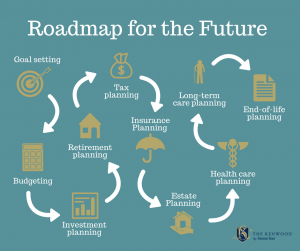 When life continually adjusts, having a financial plan will help you prepare for any changing circumstances.
When life continually adjusts, having a financial plan will help you prepare for any changing circumstances.
A financial plan shouldn’t be disregarded for years. You’ll want to review and revise it periodically as life changes, says Matt. St. Clair, CFP®, CLU®, ChFC®, Financial Advisor with Northwestern Mutual.
There are many points to consider in preparing for retirement, and you’ll need professionals to help you. While you might rely on an accountant for tax advice, a lawyer for estate planning guidance and a broker for investment decisions, you should consider your needs and situation holistically. That’s where a financial planner can help, St. Clair says.
Here are many the factors you should consider when preparing your roadmap for the future:
Goal setting
You need to establish short- and long-term goals in light of your personal situation.
Budgeting
Understanding and managing your spending is essential to your long-term financial health.
Investment planning
Most retirees rely on investment income for living expense and need to steer clear of speculative investments. Make sure your portfolio reflects your life stage.
Retirement planning
Deciding where to live – at home, with a child, in a senior living community – will have a big impact on your financial future.
Tax planning
You need to understand how tapping your Social Security, pension and retirement benefits will impact your tax situation.
Insurance planning
Should you buy long-term care insurance or life insurance? If so, when? How much? Will you need a Medigap policy?
Estate planning
Do you hope to pass on assets to your heirs or to charitable organizations? How does that desire mesh with your needs to use assets to generate income in retirement?
Health care planning
Your health and your spouse’s health will have a major impact on your financial status in retirement. Work with your financial advisor to develop a financial strategy. This will help you address potential health crises and long-term care needs.
Long-term care planning
Long-term care is expensive. Whether you opt to purchase insurance, use assets (such as your home) to generate income or seek Medicaid eligibility, you need a plan.
End-of-life planning
End-of-life documents (including living wills) and durable powers of attorney for health care and finances (i.e. health care proxy) enable your loved ones to help you and ensure your wishes are carried out.
For more information on the cost of senior living, and help with understanding your financing options, download The Kenwood’s Your Financial Guide to Senior Living.
